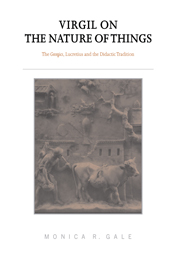Book contents
- Frontmatter
- Contents
- Preface
- List of abbreviations
- 1 Introduction: influence, allusion, intertextuality
- 2 Beginnings and endings
- 3 The gods, the farmer and the natural world
- 4 Virgil's metamorphoses: mythological allusions
- 5 Labor improbus
- 6 The wonders of the natural world
- 7 The cosmic battlefield: warfare and military imagery
- 8 Epilogue: the philosopher and the farmer
- Bibliography
- Index of passages cited
- General index
6 - The wonders of the natural world
Published online by Cambridge University Press: 15 October 2009
- Frontmatter
- Contents
- Preface
- List of abbreviations
- 1 Introduction: influence, allusion, intertextuality
- 2 Beginnings and endings
- 3 The gods, the farmer and the natural world
- 4 Virgil's metamorphoses: mythological allusions
- 5 Labor improbus
- 6 The wonders of the natural world
- 7 The cosmic battlefield: warfare and military imagery
- 8 Epilogue: the philosopher and the farmer
- Bibliography
- Index of passages cited
- General index
Summary
Ratio and miratio
To what extent is the natural world susceptible to rational understanding and explanation? To what extent can it be seen as ordered, regular, predictable? Lucretius' answer to these questions is confident and unambiguous. Epicurus taught mankind the fundamental principles which govern the behaviour of everything in the universe, from microscopic atoms and invisible souls to elephants and thunderstorms:
refert nobis victor quid possit oriri,
quid nequeat, finita potestas denique cuique
quanam sit ratione atque alte terminus haerens.
1.75–7He brought back to us, victoriously, knowledge of what can come to be and what cannot – how, in short, the power of each thing has its limit and its deep-set boundary-stone.
The universality of these principles is most clearly illustrated in DRN 6, where Lucretius sets out to explain a range of frightening and curious phenomena, from lightning to magnetism. What unites this motley assortment of topics is that all the phenomena discussed have a tendency to evoke fear or wonder; and wonder is a dangerous emotion, leading all too often to fear and superstition:
nam bene qui didicere deos securum agere aevum,
si tamen interea mirantur qua ratione
quaeque geri possint, praesertim rebus in illis
quae supera caput aetheriis cernuntur in oris,
rursus in antiquas referuntur religiones
et dominos acris adsciscunt, omnia posse
quos miseri credunt, ignari quid queat esse,
quid nequeat, finita potestas denique cuique
quanam sit ratione atque alte terminus haerens.
5.82–90=6.58–66- Type
- Chapter
- Information
- Virgil on the Nature of ThingsThe Georgics, Lucretius and the Didactic Tradition, pp. 196 - 231Publisher: Cambridge University PressPrint publication year: 2000



